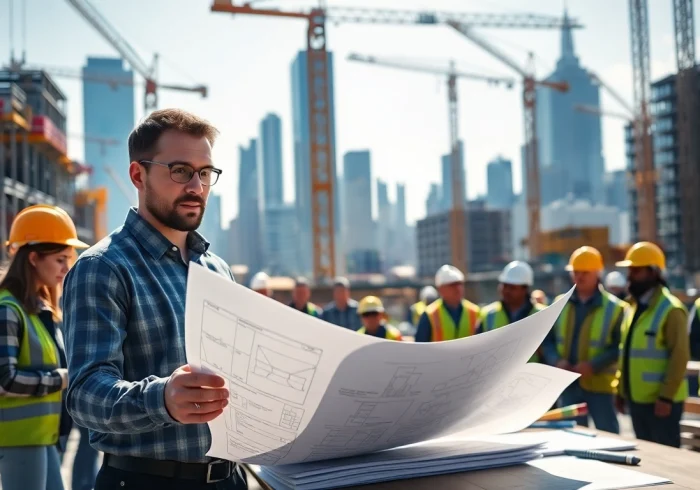The Role of a Manhattan Construction Manager
The construction industry is a dynamic field where effective management plays a pivotal role in ensuring project success. A Manhattan Construction Manager serves as the cornerstone of project execution, facilitating seamless coordination among various stakeholders, and overseeing construction processes to ensure that projects are completed on time, within budget, and to the required quality standards. Understanding the multifaceted responsibilities of a Manhattan Construction Manager can provide valuable insights for stakeholders engaged in construction projects.
Key Responsibilities and Tasks
A Manhattan Construction Manager is responsible for a variety of crucial tasks that ensure the smooth operation of construction projects. Their primary responsibilities include:
- Project Planning and Scheduling: Creating detailed project plans and schedules that outline timelines, resource allocation, and milestones is essential. A well-structured plan not only guides the construction team but also sets clear expectations for all involved parties.
- Budget Management: Overseeing project budgets includes estimating costs, tracking expenses, and ensuring that financial resources are effectively utilized. This responsibility necessitates precise forecasting and regular financial reporting.
- Resource Coordination: A construction manager must coordinate labor, materials, and equipment to optimize productivity. They need to establish relationships with subcontractors and suppliers, ensuring that resources are available when needed.
- Quality Control: Ensuring that construction activities meet established standards and specifications is critical. This involves regular inspections and adherence to safety protocols to maintain a safe working environment.
- Communication: Maintaining clear lines of communication between clients, architects, engineers, and subcontractors ensures that project updates, potential issues, and resolutions are conveyed effectively.
- Risk Management: Identifying potential risks, assessing their impact, and developing mitigation strategies is vital for minimizing disruptions during construction.
Skills and Qualifications Required
To excel as a Manhattan Construction Manager, a combination of formal education, hands-on experience, and key skills is paramount. Essential qualifications and skills include:
- Educational Background: A degree in construction management, civil engineering, or a related field provides foundational knowledge essential for managing construction projects.
- Project Management Certifications: Credentials such as Project Management Professional (PMP) or Certified Construction Manager (CCM) may enhance a manager’s qualifications and signal expertise to potential clients.
- Technical Skills: Familiarity with construction methodologies, engineering principles, and relevant technology (such as Building Information Modeling, BIM) is crucial.
- Leadership Abilities: Strong leadership skills are necessary for motivating teams, resolving conflicts, and making decisive actions that keep projects on track.
- Communication Skills: Effective communication fosters collaboration and understanding among all stakeholders in a construction project.
- Problem-Solving Aptitude: Quick thinking and adaptability are required to address unexpected challenges that arise during construction.
Benefits of Hiring an Experienced Manager
Engaging a seasoned Manhattan Construction Manager offers several advantages, including the following:
- Optimized Project Execution: Experienced managers can streamline processes, leveraging their knowledge to enhance efficiency and productivity.
- Cost Savings: Effective budget management and resource allocation can lead to significant cost reductions, preventing financial overruns.
- Risk Reduction: An experienced construction manager can proactively identify risks and implement strategies to mitigate potential disruptions to the project.
- Quality Assurance: Their expertise ensures that work meets or exceeds quality standards, resulting in a durable and successful finished product.
- Enhanced Communication: Their proficiency in stakeholder engagement promotes better collaboration among teams, leading to improved project outcomes.
Challenges Faced by Manhattan Construction Managers
Common Project Hurdles
Some of the most common challenges encountered by construction managers include:
- Unforeseen Delays: Environmental factors, supply chain disruptions, and labor shortages can hinder project timelines significantly.
- Budget Constraints: Fluctuations in material costs or changes in project scope can jeopardize the financial stability of a project.
- Regulatory Compliance: Navigating the labyrinth of zoning laws, building codes, and safety regulations can be daunting.
- Safety Issues: Maintaining a safe worksite is fundamental, yet accidents can occur, leading to delays, increased costs, and potential legal repercussions.
Managing Stakeholder Expectations
Effective management of stakeholder expectations is crucial for project success. This involves:
- Frequent Updates: Keeping stakeholders informed about project status, budget, and timelines builds trust and avoids misunderstandings.
- Setting Realistic Goals: Clearly defining project scopes and limitations at the outset helps align stakeholder expectations with project realities.
- Addressing Concerns Promptly: Listening to and addressing stakeholder concerns as they arise can prevent unresolved issues from escalating later.
Risk Assessment and Mitigation
Developing a robust risk management strategy is essential. This includes:
- Risk Identification: Regular risk assessment sessions help pinpoint potential obstacles before they manifest.
- Creating Contingency Plans: Establishing backup plans allows the team to respond quickly and effectively to emergent issues.
- Risk Monitoring: Continuous monitoring of risk factors allows managers to adjust strategies proactively, ensuring minimal disruption to project progress.
Best Practices for Effective Construction Management
Implementing best practices in construction management can lead to enhanced project outcomes and streamline operations.
Implementing Effective Communication
Strong communication strategies include:
- Regular Meetings: Scheduling consistent project meetings ensures that all team members are aligned and informed.
- Utilizing Project Management Tools: Integrating software platforms for communication can facilitate real-time updates and documentation.
- Open Dialogue: Creating an open environment encourages team members to share concerns and suggestions freely.
Utilizing Construction Management Software
Construction management software plays a crucial role in modern project management. Key benefits include:
- Improved Efficiency: Automation of routine tasks reduces workload and minimizes errors.
- Centralized Information: A single platform for documentation, schedules, and communication improves organization and accessibility.
- Enhanced Reporting: Real-time data tracking facilitates better decision-making and analysis throughout the project lifecycle.
Establishing a Safety Culture
Fostering a safety-first culture within construction teams is paramount. This can be achieved by:
- Conducting Training: Regular safety training sessions keep teams informed about practices and protocols.
- Promoting Accountability: Assigning safety responsibilities and ensuring that all team members understand their roles fosters accountability.
- Implementing Safety Protocols: Consistent enforcement of safety measures reduces accidental injuries and enhances overall project safety.
Case Studies: Successful Projects Managed by Professionals
Analyzing successful projects can provide invaluable learning opportunities and guidance for future endeavors.
Analyzing Successful Construction Projects
Successful construction projects often share common attributes, such as meticulous planning, effective communication, and a solid management structure. By studying these projects, aspiring construction managers can adopt best practices and strategies that have proven effective.
Lessons Learned from Industry Leaders
Senior construction managers often emphasize the importance of flexibility and adaptability. Learning from their experiences can help emerging managers navigate complexities with greater ease.
Innovative Solutions Implemented
Embracing innovative technologies and processes, such as lean construction methods and modular building techniques, can lead to enhanced efficiency and reduced waste within the construction industry. Staying abreast of industry innovations is vital for maintaining competitive advantages.
Finding the Right Manhattan Construction Manager
Choosing the correct Manhattan Construction Manager is fundamental to achieving your construction project’s objectives. Here are some guidelines to follow:
Where to Look for Candidates
Consider the following avenues for sourcing qualified construction managers:
- Industry Associations: Organizations related to construction management often maintain directories of professionals.
- Networking Events: Attend industry events and conferences to connect with potential candidates and gain insights into their expertise.
- Job Boards and Recruitment Agencies: Utilize targeted job platforms and agencies specializing in construction management to find suitable candidates.
Interview Questions to Ask
During the interview process, consider asking the following questions:
- Can you describe your experience with similar projects?
- How do you handle conflict among team members?
- What strategies do you use for budget management and cost control?
Assessing Previous Project Success
When evaluating potential candidates, consider their track record and previous successes. Key factors include:
- Project Portfolio: Review their history of completed projects to gauge their experience and quality of work.
- Client Feedback: Feedback from previous clients can provide insight into their effectiveness and professionalism.
- Problem-Solving Skills: Assess their ability to navigate challenges by discussing past project obstacles and resolutions.



